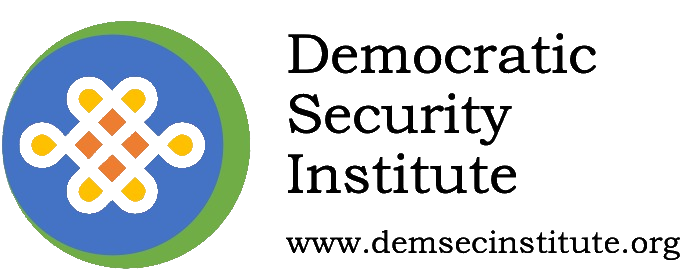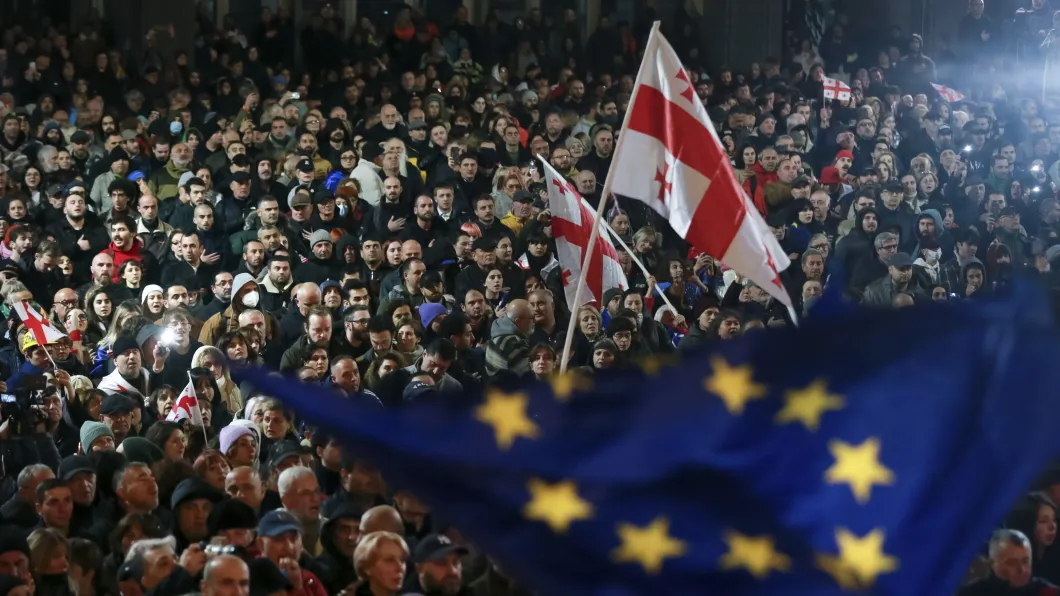Georgia’s parliamentary elections late last month appeared to be a test of the country’s democracy and the viability of its longstanding Euro-Atlantic path. Amid credible allegations of irregularities, official results giving the incumbent Georgian Dream, or GD, party a commanding lead sparked protests at home and incredulity abroad. Whether GD can hold on, and how Washington and Brussels react, may determine the long-term direction of not only Georgia, but also the wider region.
Read full article on World Politics Review
When voting came to a close on Oct. 26, two exit polls from independent, international polling firms put the four opposition parties that cleared the 5 percent parliamentary threshold collectively ahead of GD, with one showing a margin of 52-41 percent and the other of 48-42 percent. Only hours later, however, the official results released by the Central Election Commission, or CEC, painted a very different picture, giving GD a 53-38 percent victory. That would improbably give GD—whose popularity has taken a hit over the past few years—its best showing since it came to power in 2012.
Since then, protesters have taken to the streets claiming fraud and demanding new elections at the very least. However, despite some strong international reactions, the Georgian elections and their disputed results took a clear backstage to the run-up to and aftermath of the U.S. presidential election last week. If there’s one thing that both GD and the opposition can agree on, it is that the return of former U.S. President Donald Trump to the White House will have a significant impact on their own perceived fortunes. In the meantime, the country’s future continues to be contested domestically and may remain in limbo until momentum—or inertia—accrues to one side or the other.
In response to the election, the joint observation mission led by the Organization for Security and Cooperation in Europe issued a notably critical early assessment. “[T]he campaign offered voters a wide choice in the run-up to Georgia’s parliamentary elections,” said Eoghan Murphy, head of the OSCE’s election mission, “[but] that is not enough to bring an election in line with international democratic principles.” In Tbilisi, Georgian President Salome Zourabichvili rejected the results and accused GD of stealing the election. Internationally, a tidal wave of alarms flooded in from North America and Europe over the quality of the vote, with the European Union effectively freezing Georgia’s EU candidacy and suspending foreign aid in the election’s aftermath.
Discordant exit polls were hardly the only sign of election day issues. Historically, pre-election polls from Western firms had successfully predicted the results in Georgia’s previous elections, and their exit polls also tended to align with the final CEC numbers. In this case, however, the CEC figures represented a statistically unlikely 20-point swing between GD’s 10-point average deficit in the exit polls and its 10-point advantage in the final tally. In subsequent analyses, Edison Research and HarrisX, the Western pollsters commissioned by opposition-leaning television channels, both concluded that such a discrepancy could not be accounted for through normal statistical variation, implying fraud. Separately, other vote analyses using CEC data showed major statistical anomalies in rural districts, the GD’s heartland that tends to be less closely scrutinized by election observers, pointing to vote manipulation.
These signals are notable amid growing reports of widespread abuses of administrative resources, carousel voting, voter intimidation and voter surveillance on election day. Taken together, evidence is mounting that Georgia’s elections were neither free nor fair and that the CEC numbers do not accurately reflect the will of the Georgian electorate. However, protests and vocal outcry notwithstanding, the path for a near-term resolution of the growing standoff between the opposition and the ruling party is still unclear.
The Georgian elections have major implications for the country, which is divided between a population that largely leans toward a Euro-Atlantic alignment and an increasingly authoritarian government that has increasingly cozied up to Moscow and other authoritarian regimes in its bid to stay in power. Should GD manage to hold on, it has pledged to ban opposition parties, engage in mass repression and align with Moscow in exchange for a deal over its breakaway territories. Should that come to pass, Georgia’s role as a longstanding partner and aspiring member of the Euro-Atlantic coalition will be effectively ended, foreclosing any near-term prospects for Western integration at best and ushering in vassalage to Moscow and potentially the effective end of its independence at worst.
In hard strategic terms, this is a serious dilemma but not necessarily a nightmare for Washington. U.S.-Georgia relations are primarily values-driven and not based on any particular material benefit that accrues to U.S. strategic interests. While Georgia’s security partnership with the U.S. and Europe during the 2010s made it a player on a number of issues, elevating it well beyond what its small size and relatively distant geography might seem to warrant, it is not itself a major producer of energy or natural resources, nor does it possess the kind of first-rate military or sizable economy that might make it a top strategic priority for U.S. policymakers. While a deep well of affection and residual goodwill for Tbilisi in Washington and European capitals has allowed it to enjoy access and some influence over the years, it is likely that a fully autocratic and Moscow-leaning Georgia will simply slip off the agenda.
At the same time, the health of Georgia’s democracy itself has genuine strategic implications. Georgia’s role as a functioning—if somewhat raucous—democracy posed a fundamental challenge to neighboring Russia and, to a lesser extent, to authoritarian regimes in Azerbaijan and Iran, attracting a good deal of hostility as a result. That placed Georgia in a more delicate strategic position, given its remoteness and small size, but also brought Tbilisi an unusual level of attention as well as political and economic support from the U.S. and Europe. Should Tbilisi align more evidently with Moscow and its democracy be extinguished, so too would its principal means of international leverage. While GD leaders may hope that a post-election rapprochement with Russia might allow it to pursue a more “multi-vectored” foreign policy, an undemocratic, kleptocratic Georgia would have little independent value to attract Washington and balance Moscow.
In the region, Georgia’s strategic diminution could have cascading effects. For one, it would further empower the ascendancy of Azerbaijan, which has instrumentalized an opportunistic alliance with Russia to achieve regional military superiority over Armenia. In turn, Baku dutifully worked to ensure GD’s hold on power. As things stand, Azerbaijan’s bet on Moscow has been validated, further cementing Russian power in the region. This in turn will further isolate Armenia, which toppled its pro-Russian kleptocratic government in a 2018 revolution and has turned decidedly toward partnership with Washington and Europe since Azerbaijan’s decisive military victory—abetted by Moscow’s inaction—in the decadeslong dispute over Nagorno-Karabakh two years ago. Other than Iran, Georgia is Armenia’s primary outlet to the world, making a pro-Moscow and antidemocratic Tbilisi a troubling development for Yerevan’s own stability and security. That helps explain Armenia’s quick congratulations to GD on its purported election victory. In effect, as goes Georgia, so goes the South Caucasus as a whole.
In the immediate term, both the opposition and GD alike will be looking for more forceful signals from the international community, and particularly the United States now that its election has been settled. A new Trump administration may be less broadly concerned with international human rights or democracy, as GD may be hoping. However, it will likely have little interest in Georgia altogether and could be happy to defer on policy to congressional Republicans, who if anything have been more hawkish toward Tbilisi for the most part.
However, the most crucial factor is the Georgian people themselves and specifically the degree to which they either actively oppose the widespread vote manipulations or passively tolerate them. Either way, it is the popular response in Georgia that will determine the direction and tenor of Western efforts, and not the other way around.
This makes the growing protests in Georgia an important determining factor. Through its obstinate passage of a Russian-style “foreign agent” law earlier this year, overriding historic protests throughout the country as well as vocal reprimands from Brussels and Washington, GD has shown that it is able and willing to weather mass demonstrations to achieve a desired outcome. At the same time, GD’s strategy was specifically predicated on the idea that it could sap the energy of the political opposition and civil society activists ahead of the election.
More vociferous and extended protests would likely further undermine GD’s already fragile basis for popular legitimacy—and elicit a more robust Western response. Whether that will be enough to reverse Tbilisi’s slide toward a Russia-aligned authoritarianism is another story.
Michael Hikari Cecire is an adjunct associate professor at Georgetown University’s Center for Security Studies and a doctoral researcher at the University of St Andrews. Until recently, he served as a senior foreign policy adviser to Congress.

